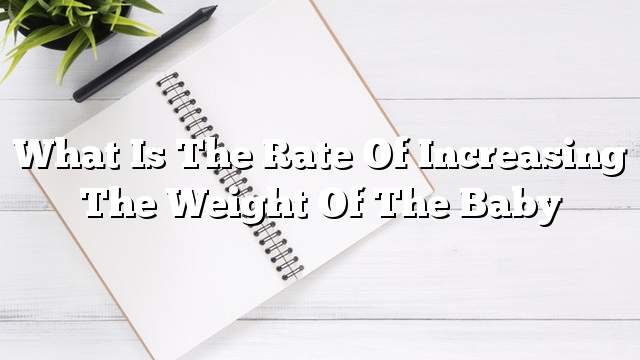The normal gestational age is between 38-40 weeks, equivalent to nine months, during which the fetus develops naturally and physically and mentally. The normal weight of the fetus at the end of the ninth month, ie, when the natural gestation period is between 3 kg and Three and a half, and can be exceeded by some births and be a few cases where up to four kilos and more and the weight of the fetus at this stage for the health of the mother and the extent of the body’s mother’s obesity.
The fetus feeds inside the mother’s womb through the placenta and is responsible for the growth and weight of the fetus. From the first moment the child is born, the way the baby feeds is changed through breast-feeding and to learn more about the child’s growth and growth. Which is beneficial to your child’s health.
A newborn is a term given to newborns from one day to one month. The normal weight of newborns up to five years of age is as follows:
- At birth, the average normal rate is between three kilograms and three and a half and at the end of the first month of life of the baby increases the weight of one kilogram and the length of the increase by (4_5) cm.
- During the first year of the child’s life, the weight and weight of the child grows rapidly and markedly. This increase is considered a clear indication of health and growth. At the end of the first year, the weight of the child increases by three times its weight at birth, and also increases by 50% Birth, knowing that these numbers are subject to change, but is the measure of the vast majority as it can increase or decrease and be within the normal range.
- If you do not increase the weight of the child in a noticeable way, it is advisable to visit the doctor to find out what are the reasons that prevent the weight of the child, or that the increase in weight excessive in both cases there is a clear defect in the child must be sure of the absence of diseases.
- In the second month of life, the rate of increase is less than 5%.
- The third month increases the weight of the child by 900 grams and in the third month almost increases the same amount, but when the child reaches the fourth month, the increase rate of about 10% because of the movement of the child and activity.
- The increase is constant until the end of the year until the end of the year between (8 – 10) kg, which is normal and healthy to increase the weight of the child.
- During the second year, the weight of the child increases less than the first year as the weight becomes at the end of the second year between 10-14 kg.
- When the child reaches the third year, the weight and longevity of growth is slow as the rate of increase in weight is low and the weight is between (14-15), one rate of one kilogram per year to two kilos.
- The fourth year is the weight of the child has reached 16 kg.
- The fifth year is between 17-18 kg.
- As for the sixth and seventh year, the increase is very low, ie, 500 grams is not clear and remains the increase in this amount until the age of ten, as the increase in weight have other effects and the nature of the food that the child, and prefer to care for the child at this stage because the fat child becomes A young man is fat in the future because most of the fat is stored in the body.
